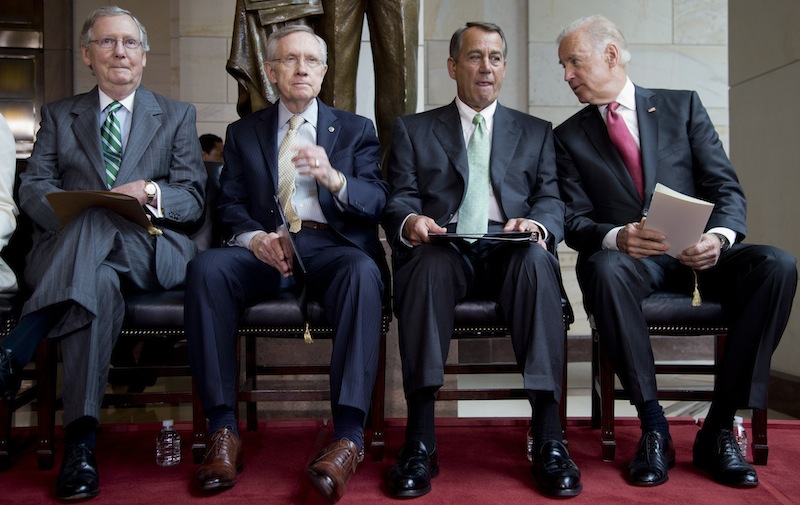WASHINGTON (AP) — At the prodding of business organizations, House Republicans quietly secured a recent change in President Barack Obama’s health law to expand coverage choices, a striking, one-of-a-kind departure from dozens of high-decibel attempts to repeal or dismember it.
Democrats describe the change involving small-business coverage options as a straightforward improvement of the type they are eager to make, and Obama signed it into law. Republicans are loath to agree, given the strong sentiment among the rank and file that the only fix the law deserves is a burial.
“Maybe you say it helps (Obamacare), but it really helps the small businessman,” said Rep. Phil Roe, R-Tenn., one of several physician-lawmakers among Republicans and an advocate of repeal.
No member of the House GOP leadership has publicly hailed the fix, which was tucked, at Republicans’ request, into legislation preventing a cut in payments to doctors who treat Medicare patients.
It is unclear how many members of the House rank and file knew of it because the legislation was passed by a highly unusual voice vote without debate.
Several lobbyists and Republican aides who monitored the issue said the provision reflects a calculation that no matter how hard the party tries, the earliest the law can be repealed is after Obama leaves office in 2017. In the meantime, according to this line of thinking, small-business owners need all the flexibility that can get to comply with it.
One repeal-favoring Republican lawmaker took a similar view. “I was brought up in a family of 12. My mother taught me to be patient,” said Rep. Tom Reed of New York, who backed a stand-alone bill to make the same change.
The provision itself was relatively minor. It eliminated a cap on deductibles for small group policies offered inside the law’s health care exchanges as well as outside; the cap was set at $2,000 for individuals and $4,000 for families.
Republicans said they sought it so small businesses can offer high-deductible plans that could be purchased by individuals who also have health savings accounts. These tax-preferred accounts are a long-time favorite of many Republicans, who say they give consumers greater control over their own health care.
The health law contains no deductible caps for individual plans or those offered by large employers, and the Department of Health and Human Services already had waived them for small businesses through 2015. The legislation means they will never go into effect.
As yet, there is no indication the change in course heralds any sort of significant pre-election change in attitude by Republicans, who last week engineered their 52nd vote in the House to repeal or dismember the law. They have said they intend to make its elimination a key element in the November election.
At the same time, though, administration officials announced last week that more than 7 million people have signed up for coverage. Democrats hope to counter demands for repeal by challenging critics to explain why they want to eliminate some of politically popular provisions such as guaranteed of coverage for pre-existing condition or plans without a lifetime cap in coverage costs.
Fittingly in an era of divided government, now that the change has been made, officials in both parties are once more at odds, each describing it as a victory for their side in a ceaseless political struggle.
Asked if the legislation strengthened the law, Senate Majority Leader Harry Reid, D-Nev., said, “I would hope so. I believe that” it does. He added, “So there are changes being made. But the Republicans have to get over if they hate ‘Obamacare’ and are going to repeal it,” he added.
Rory Cooper, a spokesman for House Majority Leader Eric Cantor, R-Va., said, “This is another in a series of changes to Obamacare that the House has supported to help save Americans from being harmed by the law, and we’re glad to see the President signed it into law.” Cantor was involved in negotiations on the legislation, which were overseen by Speaker John Boehner, R-Ohio, and Reid.
While Cooper described the change merely as one of several designed to prevent harm, the episode marks the first time Republicans have agreed to make it easier for anyone to obtain coverage under the law.
According to a list maintained by the office of the House Republican whip, Rep. Kevin McCarthy of California, five of the eight previous changes signed by Obama reduced funding; one repealed a minor voucher provision; one jettisoned a section dealing with home care for the elderly; and the other eliminated a tax reporting requirement.
In this case, though, large business organizations that support repeal pressed Republicans to make the change.
“Repealing the annual limitation on deductible would free up an important “lever” that employers need as they struggle to design affordable plans that meet the requirements” of the law, R. Bruce Josten, executive vice president at the U.S. Chamber of Commerce, wrote senior lawmakers. He expressed satisfaction with HHS’ waiver, yet added, “a more permanent and predictable solution is critical.”
Democrats said the now-defunct limitation was inserted into the original law in an unsuccessful attempt to win the vote of former Republican Sen. Olympia Snowe of Maine. She supported the bill in the Senate Finance Committee but opposed it on the Senate floor.






